Androwe Surname Ancestry ResultsOur indexes 1000-1999 include entries for the spelling 'androwe'. In the period you have requested, we have the following 14 records (displaying 1 to 10): Buy all | | | Get all 14 records to view, to save and print for £64.00 |
These sample scans are from the original record. You will get scans of the full pages or articles where the surname you searched for has been found. Your web browser may prevent the sample windows from opening; in this case please change your browser settings to allow pop-up windows from this site. Murderers sheltering in Beverley Minster: and their victims
(1478-1539)
Criminals could evade pursuit by claiming sanctuary in the church of St John in Beverley, in the East Riding of Yorkshire. This liberty of the minster extended a league in every direction from the church door, and was divided into six sections, each giving greater sanctity to the rights of sanctuary, the sixth and innermost section being the presbitery or chancel. Near the altar there was a stone chair called the Frith Stool, seated on which an accused could claim total immunity. The bailiff would receive the oath of the fugitive, and a clerk recorded 'what man he killed, and wher with, and both ther namez'; the bailiff receiving a fee of 2s 4d, the clerk 4d. Sanctuary was afforded for 30 days, with food and lodging, after which the fugitive was protected to the borders of the county. But within 40 days he had to appear before the coroner, clothed in sackcloth, and be branded on his right hand with the sign of the letter A. This signified that he was swearing to abjure the realm: he was then free to leave the country unhindered. At Beverley the clerks kept a separate register of fugitives' petitions, which survives from 1478 to 1539 in Harleian Manuscript 560. It was edited and printed by the Surtees Society in 1837 under the title Sanctuarium Beverlacense. Some of the criminals came from a considerable distance: the great majority were murderers or homicides. Each entry usually gives full name, original address, (often) trade, a brief description of the crime, often with date, and usually the name of the victim. This index covers all the surnames given.ANDROWE. Cost: £4.00.  | Sample scan, click to enlarge
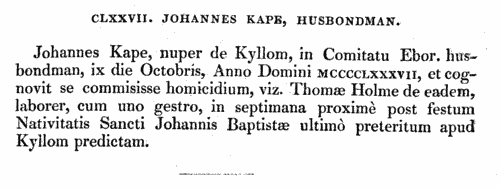
| Stanley Lay Subsidy: Final Return
(1545)
The lay subsidy of Agbrigg wapentake in the West Riding of Yorkshire (207/186) is in two parts: the anticipation and the final return. The subsidy, assessed at 1d in the pound on goods up to £5, 2d in the pound on goods worth £5 and above, and 2d in the pound on land, had been granted by parliament to king Henry VIII for three years. The anticipation, certified by the commissioners 30 April 1545, listed by township the holders of £6 or more in land or £10 or more in goods 'which said persons by virtue of our souerayng lords most jentill request and lovyng desire ar content frankly, quietly and indeladby to pay ther last payment' in advance, by way of anticipation of the third year's payment. The final return, certified 26 October 1545, lists the less wealthy part of the population, again by township, with their full names, assessment of their property, and (right-hand column) the amount due to be collected from them.ANDROWE. Cost: £4.00.  | Sample scan, click to enlarge
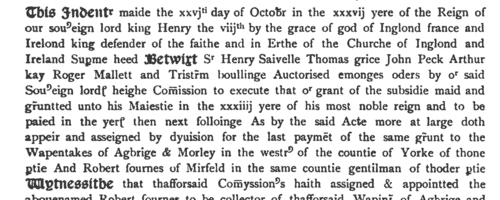
| Retired monks, nuns and chantry priests in the east Midlands
(1547-1551)
Lists of pensions being paid to monks, nuns and chantry priests in the diocese of Lincoln after the dissolution of the monasteries and chantries. The diocese covered Bedfordshire, Buckinghamshire, part of Hertfordshire, Huntingdonshire, Leicestershire and Lincolnshire. Oxfordshire, Northamptonshire and Rutland, which had been shorn from the diocese, are not covered by these returns.
ANDROWE. Cost: £6.00.  | Sample scan, click to enlarge

| Liegemen and Traitors, Pirates and Spies
(1550-1552)
The Privy Council of Edward VI was responsible for internal security in England and Wales, and dealt with all manner of special and urgent matters
ANDROWE. Cost: £4.00.  | Sample scan, click to enlarge

| Tenants, founders and incumbents of Lancashire chantries
(1546-1554)
Chantries were established to perform services for the souls of their founders and other faithful dead, including annual obits and anniversaries at which alms were usually distributed. The chantries could be at an existing altar in a parish church, a new altar in a side chapel of an existing church, in a new chapel in the churchyard or some miles from an existing church: few were founded before 1300, and most date from 1450 to 1500. Hospitals were places provided by similar foundations to receive the poor and weak; there were also religious guilds, brotherhoods and fraternities, and colleges (like large chantries at which three or more secular priests lived in common). An Act of Parliament of 1545 gave king Henry VIII the power to dissolve such chantries, chapels, &c., the proceeds to be devoted to the expenses of the wars in France and Scotland. Commissioners were appointed 14 February 1546 to survey the chantries and seize their property, and from 1546 to 1548 the commissioners produced these certificates giving brief details of the establishment and nature of each foundation, with an inventory of valuables and rental of lands. The individuals named in the certificates are thus the founder, the present incumbent, and the tenants whose rents provided the chantry's income. All the surviving certificates for Lancashire were edited by the Reverend F. R. Raines for the Chetham Society, and published from 1862.ANDROWE. Cost: £6.00.  | Sample scan, click to enlarge

| Tradesmen of York
(1272-1558)
No man or woman could trade in the city of York without having obtained 'freedom' of the city.Their names were recorded on the 'Freemen's Roll', or Register of the Freemen of the City of York, which contains about 19,900 names for this period. A list of names was prepared for each year, the year being here reckoned as starting at Michaelmas (29 September) until 1373, and thence at Candlemas (2 February). Each annual list starts with the name of the mayor and the camerarii or chamberlains. The chamberlains were freemen charged with the duty of receiving the fees of the new freemen; of seeing that only freemen traded in the city; and of preparing this roll, which was compiled from the names on their own account books from the receipts for the fees. There are three groups of freemen: those who obtained freedom after serving out an apprenticeship to a freeman; the children of freemen; and those who claimed freedom by 'redemption', i. e. by purchase or gift from the Mayor and Court of Aldermen.
ANDROWE. Cost: £2.00.  | Sample scan, click to enlarge

| Militia in Abdick hundred, Somerset
(1569)
A muster of the ablemen, gunners, light horsemen, pikemen, archers and billmen available from this hundred, compiled by sir Hugh Paulet, sir Maurice Barkeley, sir Ralph Hopton and John Horner in answer to a royal commission of the 11th year of queen Elizabeth. The returns are arranged by tithing. The hundred consisted of the parishes of Ashill, Bickenhall, Curry Mallet, Donyatt, Hatch Beauchamp, Ilton, Isle Abbotts, Staple Fitzpaine and White Lackington, northeast of Ilminster. (The sample shown is from the return for the borough of Axbridge)ANDROWE. Cost: £6.00.  | Sample scan, click to enlarge
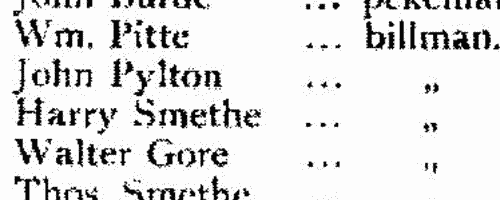
| Militia in Martock hundred, Somerset
(1569)
A muster of the ablemen, gunners, light horsemen, pikemen, archers and billmen available from this hundred, compiled by sir Hugh Paulet, sir Maurice Barkeley, sir Ralph Hopton and John Horner in answer to a royal commission of the 11th year of queen Elizabeth. The returns are arranged by tithing. The hundred consisted of the parish of Martock. (The sample shown is from the return for the borough of Axbridge)ANDROWE. Cost: £6.00.  | Sample scan, click to enlarge
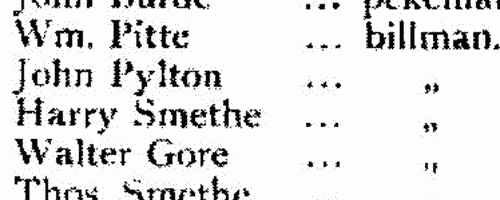
| Militia in South Petherton hundred, Somerset
(1569)
A muster of the ablemen, gunners, light horsemen, pikemen, archers and billmen available from this hundred, compiled by sir Hugh Paulet, sir Maurice Barkeley, sir Ralph Hopton and John Horner in answer to a royal commission of the 11th year of queen Elizabeth. The returns are arranged by tithing. The hundred consisted of the parishes of Barrington, Chaffcombe, Chillington, Cricket St Thomas, Cudworth, Dinnington, Dowlish Wake, Knowle St Giles, Lopen, Seavington St Mary, Seavington St Michael, Shepton Beauchamp, South Petherton and Whitestaunton, northwest of Chard. (The sample shown is from the return for the borough of Axbridge)ANDROWE. Cost: £6.00.  | Sample scan, click to enlarge
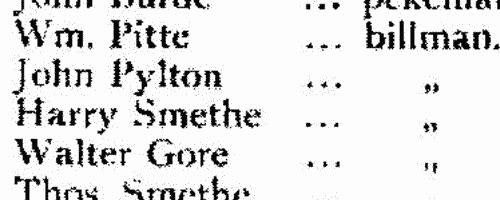
| Aliens in London (1571)
'The Reporte of the Searche of all the Straungers wythin London and Southwerk and the Liberties therof, made the xth daye of November, 1571'. The search found a total of 4,631 aliens living in the city, the great majority (3,643) being Dutch, 657 Frenchmen, 233 Italians &c. Arranged by parish and ward the report lists each householder by full name, where born, whether a denizen, (often) additional details, and how many aliens were in the household, and religion. This index includes also persons mentioned incidentally, such as employers. SP 12/82. Where there is a pair of scans for a single entry, the first gives the heading for the ward or parish.
ANDROWE. Cost: £6.00.  | Sample scan, click to enlarge

|
| 1 | 2 |  |
Research your ancestry, family history, genealogy and one-name study by direct access to original records and archives indexed by surname.
|












